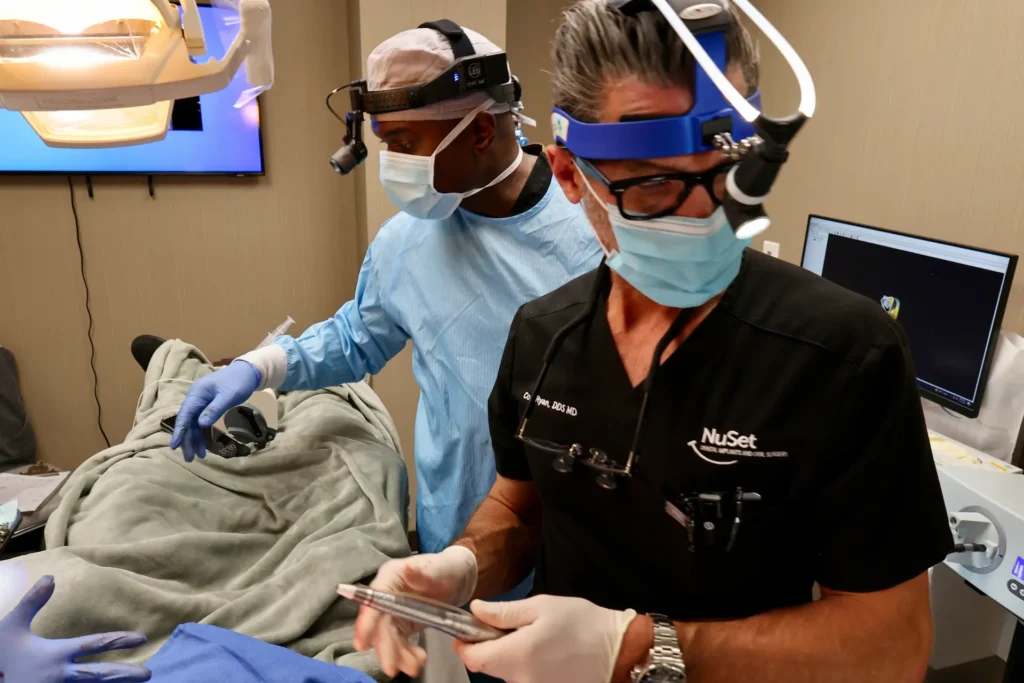One of the most exciting aspects of getting dental implants is the promise of a fully restored smile—and the ability to enjoy your favorite foods again. While the journey to healing may require some patience, dental implants offer a permanent solution that allows you to eat with confidence and comfort once you’re fully recovered.
After dental implant surgery, you may need to adjust your diet to ensure proper healing and protect your new implants. Foods that are hard, crunchy, or sticky can interfere with the healing process and potentially put your implants at risk. While your recovery diet may be a bit more limited in the early stages, the good news is that once you’re fully healed, you’ll be able to enjoy all your favorite foods again!
Key Takeaways
- Most people can eat normally soon after dental implants.
- Stick to soft foods for the first few weeks after dental implant surgery.
- Avoid hard, crunchy, sticky, and spicy foods during healing.
- Chew carefully and avoid putting pressure on the implant site.
- Drink plenty of water, but avoid using straws.
What to Expect Immediately After Dental Implant Surgery
After your dental implant surgery, your mouth needs time to heal. While it’s normal to experience some discomfort, the expert team at NuSet ensures you know what to expect and can make the process easier.
Immediately After: Pain and Swelling
You’ll likely feel numb for a few hours because of the anesthesia. Once it wears off, you may notice some tenderness around the implant site. Mild swelling is also common, especially in the first 24-48 hours.
Here’s how you can manage it:
- Use an ice pack on your cheek for 10-15 minutes at a time.
- Take prescribed pain medication or over-the-counter pain relievers as directed.
- Rest as much as possible to give your body time to heal.
First Few Days: Bleeding and Bruising
Mild bleeding may occur during the first day or two. You can control it by biting down gently on gauze. Mild bruising around your jaw or cheeks can also appear, which is normal.
To help reduce bleeding and bruising:
- Avoid rinsing your mouth vigorously or spitting.
- Stay hydrated, but avoid using straws.
First Few Weeks: Dietary Restrictions
Your gums and jawbone need time to adjust to the new implant. During this phase, stick to soft, easy-to-eat foods. Avoid anything hard, chewy, or sticky, as these can put pressure on the implant and slow down healing.
Following these steps during the first few weeks will help your implant settle properly and keep your recovery on track.
How Long to Wait Before Eating Normally After Dental Implant Surgery

You might be excited to get back to your favorite foods, but patience is key. Healing after dental implant surgery happens in stages, and so does your diet.
Most people can start eating normally about 6 to 8 weeks after surgery, but this timeline can vary. It depends on how well your implant integrates with your jawbone (a process called osseointegration) and how quickly your gums heal.
Here’s a general timeline to help you know what to expect:
- First 24-48 hours: Stick to liquids and soft foods like smoothies, broths, and yogurt. Avoid anything too hot, cold, or acidic.
- Days 2-7: Slowly introduce soft, easy-to-chew foods like mashed potatoes, scrambled eggs, and oatmeal. Avoid chewing near the implant site.
- Weeks 2-6: As you heal, you can add semi-solid foods like pasta, soft fish, and rice. Just steer clear of crunchy or sticky foods.
- After 6-8 weeks: Most people can return to their normal diet. If you’re unsure, check with your dentist before biting into hard or chewy foods.
Remember, everyone heals differently. Rushing into solid foods too soon can damage your implant and set back your progress. If you notice pain, swelling, or discomfort while eating, stick to softer foods a little longer and talk to your dentist.
What Should You Eat While Implants Are Healing?
The right foods can help you heal faster and keep your implants safe. For the first few weeks, focus on soft, nutritious options that are easy to eat and won’t irritate your gums.
Tips for Eating After Dental Implant Surgery
- Cut food into tiny pieces so you don’t have to chew much.
- Avoid putting pressure on the surgical site.
- Rushing can cause discomfort or irritation. Give your mouth time to adjust.
- Drink plenty of water, but avoid straws.
Foods to Avoid
Some foods can delay healing or even damage your implant. Stay away from:
- Hard foods like nuts, popcorn, and chips.
- Sticky foods like caramel and gum.
- Crunchy foods like raw carrots or apples.
- Spicy or acidic foods that can irritate your gums.
- Hot foods and drinks that can increase swelling.
Chewing Techniques
Chewing carefully can make a big difference. Here’s what to keep in mind:
- Avoid chewing near the implant area.
- Chew slowly and gently to avoid any pressure or pain.
- If you feel discomfort while chewing, switch to softer foods until it improves.
Soft, nutritious foods and careful chewing will help during the healing phase. It might take some patience, but your implants will thank you in the long run.
Trust the Experts for a Smooth Recovery!
Your dental implants are an investment in your health and smile, and the first few weeks are key to long-term success. At NuSet Dental Implants and Oral Surgery, we provide expert care and personalized guidance to ensure your recovery goes smoothly.
Our team has the skills, experience, and advanced tools to support you every step of the way. From dietary advice to follow-up care, we’ll help you heal safely and get back to enjoying all your favorite foods.
Let us help you protect your implants and achieve lasting results with confidence. Contact us now to get started!
Frequently Asked Questions
How long after dental implants can you eat solid foods?
You can start eating soft, solid foods like pasta, rice, and fish after 1-2 weeks. Your dentist will assess your healing progress before giving you the green light for tougher foods. It’s always best to follow their advice to avoid any setbacks.
How long after a dental implant can you chew on it?
Putting too much pressure on the area too soon can disrupt healing or cause implant failure. Once your dentist confirms the implant has stabilized, you’ll be able to chew normally.
Can you eat properly with dental implants?
Yes, once fully healed, dental implants function just like natural teeth. You can eat a full range of foods, including steak, apples, and crunchy vegetables, without discomfort or restrictions. Dental implants provide excellent stability, making chewing easy and natural. Proper care and regular dental check-ups will ensure your implants stay strong and healthy for years to come.





